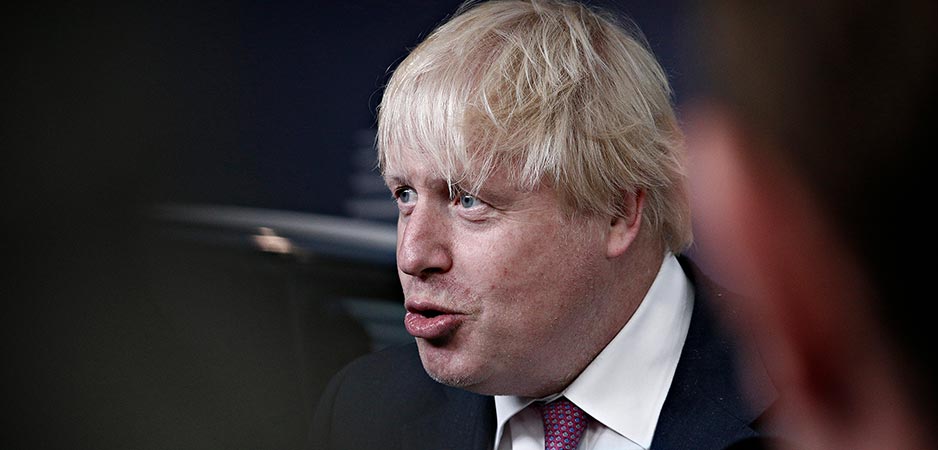The United Kingdom, or at least the majority of the 160,000 Conservative Party voters who preferred him to Jeremy Hunt, prepares to welcome Boris Johnson as its shiny new prime minister, ready to tackle Britain’s monumental problems. Sarah Lyall in The New York Times reminds her Americans readers that with Boris at Downing Street, Britain will get more than a man who loves playing the clown. It will get a colorful (and mostly blond) family, each of whom will be eager to show off their individual acts as part of the Johnson circus.
The Johnson family has never been averse to publicity. To clarify their status for Americans, the journalist places them in the “large, amorphous space between the Kennedys and the Kardashians.”
Lyall documents the unexpected but suddenly unconditional loyalty to Boris of his family members, who had in the past radically differed with him on political issues. “Whether because of sibling loyalty, or because they have been warned to behave, or because they just want to burnish their personal brands in preparation for Boris’s ascent, the Johnsons appear to be taking the approach that blood is thicker than political conviction,” she writes.
Here is today’s 3D definition:
Conviction:
For politicians, at the beginning or middle of their career, a belief about the world and moral bearings that they must learn not to allow to influence their decision-making. For some politicians, marking the end of their career, the verdict of a court that takes into account the effects of their decision-making.
Contextual Note
The article highlights a recent Boris Johnson quote designed to reinforce his appeal as a populist leader. He has proposed a policy of restricting immigration by requiring that candidates for immigration learn English. He gave as a justification that “there are too many parts of the country where it is not the first language.” This enabled him to hint at something like a theme dear to Fox News: that there are no-go zones in some British cities where only Asian languages are spoken and Islam is the only religion practiced.
What he failed to realize — Boris is known to be occasionally forgetful — is that the United Kingdom whose monarch is in England claims to have united three other countries (Scotland, Wales and Northern Ireland), the first two of which are proud of having their own language, which isn’t English. Some might even include Yorkshire in the list.
Boris has already claimed that his election is all about giving him the means of “achieving what I want to achieve.” It’s all about what Boris wants, even if he insists that it’s about what the people want. And thus Boris informs the public, “I want everybody who comes here and makes their lives here to be and to feel British.” Borrowing a page from Donald Trump, Johnson once accused Barack Obama of feeling too Kenyan — anti-British and not enough pure American (Boris was born in New York) — to appreciate the “leave” option for Brexit. Taken literally, it amounted to an admission that the colonized had good reason to despise the arrogance of their British masters. But arrogance is, of course, a major component of the Johnson brand.
Historical Note
The New York Times article focuses on the Johnson family. Lyall expresses her astonishment that an entire family — formerly committed to defending in public its carefully elaborated pro-European political convictions that happened to be at odds with those suddenly endorsed by Boris — should close ranks behind him once he was about to take over the reins of power.
Lyall only briefly mentions another glaring contradiction: the fact that career politicians with no family ties to Johnson, impressed by his successful self-marketing, are equally capable of betraying their convictions and turning on a dime (or a six-pence… though this probably wouldn’t have been the case for Conservative politicians in the days when six-pence coins still existed, before branding had taken over politics). Lyall mentions the “many Conservative politicians who were once in the Never-Boris camp but who in recent weeks have come around to something like an ‘Only Boris’ philosophy.”
The entire Boris Johnson saga is a study in historical trends. Boris himself was a “remainer” — those who wanted the UK to stay in the European Union — until he saw the advantage, in terms of his political career, of profiting from then-Prime Minister David Cameron’s risky gamble with the 2016 Brexit referendum. Johnson understood that politics is the only sport in which the goal you score against your own team may count in your favor.
Donald Trump did it in the US when we waged war against the respectable Republicans (Jeb Bush, Marco Rubio). Emmanuel Macron followed suit in France, having been ushered into politics by a Socialist president whose party he succeeded in humiliating and practically annihilating in the 2017 election.
Trump and Macron were alike in never having been elected to any political office before becoming president. In contrast, Johnson — a career hack journalist and publicity-seeker with Oxford credentials — had been elected to Parliament before being winning the race in 2008 for mayor of London. He later served as Prime Minister Theresa May’s foreign secretary. All those accomplishments were attributable less to his competence in politics (most still deem it a history of incompetence) than to his genius for Kardashian-style branding.
Johnson had no scruples about not only betraying his family’s values, all of whom were committed “remainers,” but also undermined Cameron’s middle-of-the-road, play it safe strategy for the Conservative Party that depended on the support of the unambiguously pro-European Liberal Democrats, with whom Cameron was forced to form a coalition in 2010.
At the time, all “sensible” Conservatives were reasonably happy with Britain’s role in Europe. Only those who sensed that the undercurrent of visceral and ancestral hatred of all outsiders — including dark-skinned Commonwealth invaders and even pale Polish workers — might be an effective electoral strategy dared to use that potential for personal electoral purposes. Most Conservatives aligned with the attitude of the City bankers and traders they tended to be friendly with, who delighted in London’s privileged position at the heart of the European economy.
The Boris Johnson story tells us that populism has nothing to do either with the reading and interpretation of history or the logic of institutions, and even less to do with rational political convictions. Populism is about the power of clans and the clans in power. Why else would the Johnson tribe rally not just behind their illustrious, opportunistic family member, but also behind his “ideas” and policies, which some of his closest collaborators from the past have deemed irresponsible and mad? Why else would so many members of his party who opposed him on principle suddenly join his ranks?
Americans have been asking themselves similar questions: Why did so many anti-Trump Republicans end up supporting a politician who turned out to be more extreme than they initially feared and now embrace or defend every one of Donald’s follies, however racist they may be or however contradictory with their cherished constitutional principles?
The simple answer is this: Most politicians, anywhere in the world, are addicted to the idea of electoral success and, facing the temptation of having their own seat in the halls of power, will turn as many coats as they are permitted to put on their backs throughout their political careers. Convictions can be bought and sold just like any other merchandise in today’s consumer society.
*[In the age of Oscar Wilde and Mark Twain, another American wit, the journalist Ambrose Bierce, produced a series of satirical definitions of commonly used terms, throwing light on their hidden meanings in real discourse. Bierce eventually collected and published them as a book, The Devil’s Dictionary, in 1911. We have shamelessly appropriated his title in the interest of continuing his wholesome pedagogical effort to enlighten generations of readers of the news.]
The views expressed in this article are the author’s own and do not necessarily reflect Fair Observer’s editorial policy.
Support Fair Observer
We rely on your support for our independence, diversity and quality.
For more than 10 years, Fair Observer has been free, fair and independent. No billionaire owns us, no advertisers control us. We are a reader-supported nonprofit. Unlike many other publications, we keep our content free for readers regardless of where they live or whether they can afford to pay. We have no paywalls and no ads.
In the post-truth era of fake news, echo chambers and filter bubbles, we publish a plurality of perspectives from around the world. Anyone can publish with us, but everyone goes through a rigorous editorial process. So, you get fact-checked, well-reasoned content instead of noise.
We publish 2,500+ voices from 90+ countries. We also conduct education and training programs
on subjects ranging from digital media and journalism to writing and critical thinking. This
doesn’t come cheap. Servers, editors, trainers and web developers cost
money.
Please consider supporting us on a regular basis as a recurring donor or a
sustaining member.
Will you support FO’s journalism?
We rely on your support for our independence, diversity and quality.






